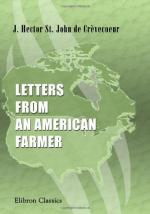nothing remains of them all, but one extraordinary
monument, and even this they owe to the industry and
religious zeal of the Europeans, I mean the Bible
translated into the Nattick tongue. Many of these
tribes giving way to the superior power of the whites,
retired to their ancient villages, collecting the scattered
remains of nations once populous; and in their grant
of lands reserved to themselves and posterity certain
portions, which lay contiguous to them. There
forgetting their ancient manners, they dwelt in peace;
in a few years their territories were surrounded by
the improvements of the Europeans; in consequence of
which they grew lazy, inactive, unwilling, and unapt
to imitate, or to follow any of our trades, and in
a few generations, either totally perished or else
came over to the Vineyard, or to this island, to re-unite
themselves with such societies of their countrymen
as would receive them. Such has been the fate
of many nations, once warlike and independent; what
we see now on the main, or on those islands, may be
justly considered as the only remains of those ancient
tribes. Might I be permitted to pay perhaps a
very useless compliment to those at least who inhabited
the great peninsula of Namset, now Cape Cod, with
whose names and ancient situation I am well acquainted.
This peninsula was divided into two great regions;
that on the side of the bay was known by the name
of Nobscusset, from one of its towns; the capital
was called Nausit (now Eastham); hence the Indians
of that region were called Nausit Indians, though they
dwelt in the villages of Pamet, Nosset, Pashee, Potomaket,
Soktoowoket, Nobscusset (Yarmouth).
The region on the Atlantic side was called Mashpee,
and contained the tribes of Hyannees, Costowet, Waquoit,
Scootin, Saconasset, Mashpee, and Namset. Several
of these Indian towns have been since converted into
flourishing European settlements, known by different
names; for as the natives were excellent judges of
land, which they had fertilised besides with the shells
of their fish, etc., the latter could not make
a better choice; though in general this great peninsula
is but a sandy pine track, a few good spots excepted.
It is divided into seven townships, viz.
Bamstable, Yarmouth, Harwich, Chatham, Eastham, Pamet,
Namset, or Province town, at the extremity of the
Cape. Yet these are very populous, though I am
at a loss to conceive on what the inhabitants live,
besides clams, oysters, and fish; their piny lands
being the most ungrateful soil in the world.
The minister of Namset or Province Town, receives from
the government of Massachusetts a salary of fifty
pounds per annum; and such is the poverty of the inhabitants
of that place, that, unable to pay him any money,
each master of a family is obliged to allow him two
hundred horse feet (sea spin) with which this primitive
priest fertilises the land of his glebe, which he tills
himself: for nothing will grow on these hungry
soils without the assistance of this extraordinary




